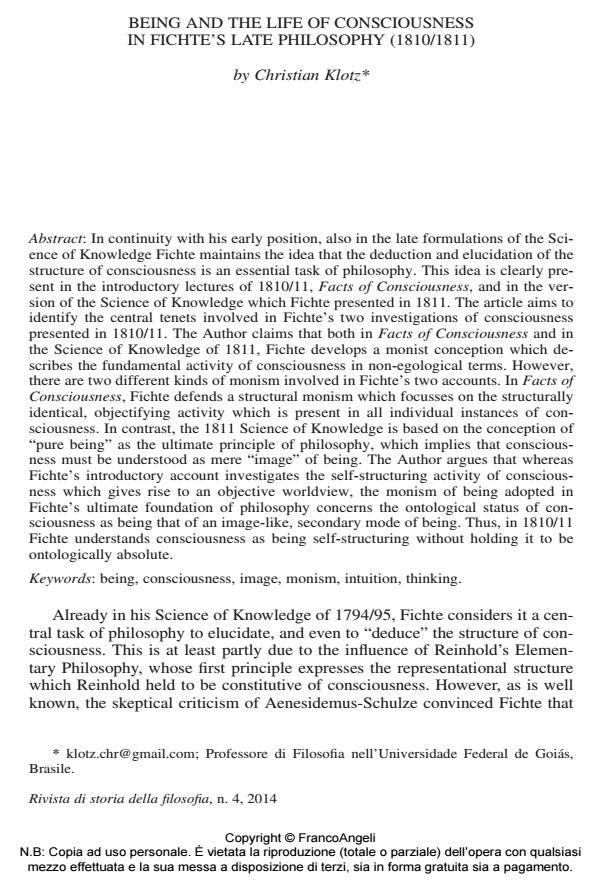Being and the life of consciousness in Fichte’s late philosophy (1810/1811)
Titolo Rivista RIVISTA DI STORIA DELLA FILOSOFIA
Autori/Curatori Christian Klotz
Anno di pubblicazione 2014 Fascicolo 2014/4
Lingua Italiano Numero pagine 9 P. 639-647 Dimensione file 64 KB
DOI 10.3280/SF2014-004005
Il DOI è il codice a barre della proprietà intellettuale: per saperne di più
clicca qui
Qui sotto puoi vedere in anteprima la prima pagina di questo articolo.
Se questo articolo ti interessa, lo puoi acquistare (e scaricare in formato pdf) seguendo le facili indicazioni per acquistare il download credit. Acquista Download Credits per scaricare questo Articolo in formato PDF

FrancoAngeli è membro della Publishers International Linking Association, Inc (PILA)associazione indipendente e non profit per facilitare (attraverso i servizi tecnologici implementati da CrossRef.org) l’accesso degli studiosi ai contenuti digitali nelle pubblicazioni professionali e scientifiche
In continuity with his early position, also in the late formulations of the Science of Knowledge Fichte maintains the idea that the deduction and elucidation of the structure of consciousness is an essential task of philosophy. This idea is clearly present in the introductory lectures of 1810/11, Facts of Consciousness, and in the version of the Science of Knowledge which Fichte presented in 1811. The article aims to identify the central tenets involved in Fichte’s two investigations of consciousness presented in 1810/11. The Author claims that both in Facts of Consciousness and in the Science of Knowledge of 1811, Fichte develops a monist conception which describes the fundamental activity of consciousness in non-egological terms. However, there are two different kinds of monism involved in Fichte’s two accounts. In Facts of Consciousness, Fichte defends a structural monism which focusses on the structurally identical, objectifying activity which is present in all individual instances of consciousness. In contrast, the 1811 Science of Knowledge is based on the conception of "pure being" as the ultimate principle of philosophy, which implies that consciousness must be understood as mere "image" of being. The Author argues that whereas Fichte’s introductory account investigates the self-structuring activity of consciousness which gives rise to an objective worldview, the monism of being adopted in Fichte’s ultimate foundation of philosophy concerns the ontological status of consciousness as being that of an image-like, secondary mode of being. Thus, in 1810/11 Fichte understands consciousness as being self-structuring without holding it to be ontologically absolute.
Parole chiave:Being, consciousness, image, monism, intuition, thinking.
Christian Klotz, Being and the life of consciousness in Fichte’s late philosophy (1810/1811) in "RIVISTA DI STORIA DELLA FILOSOFIA" 4/2014, pp 639-647, DOI: 10.3280/SF2014-004005